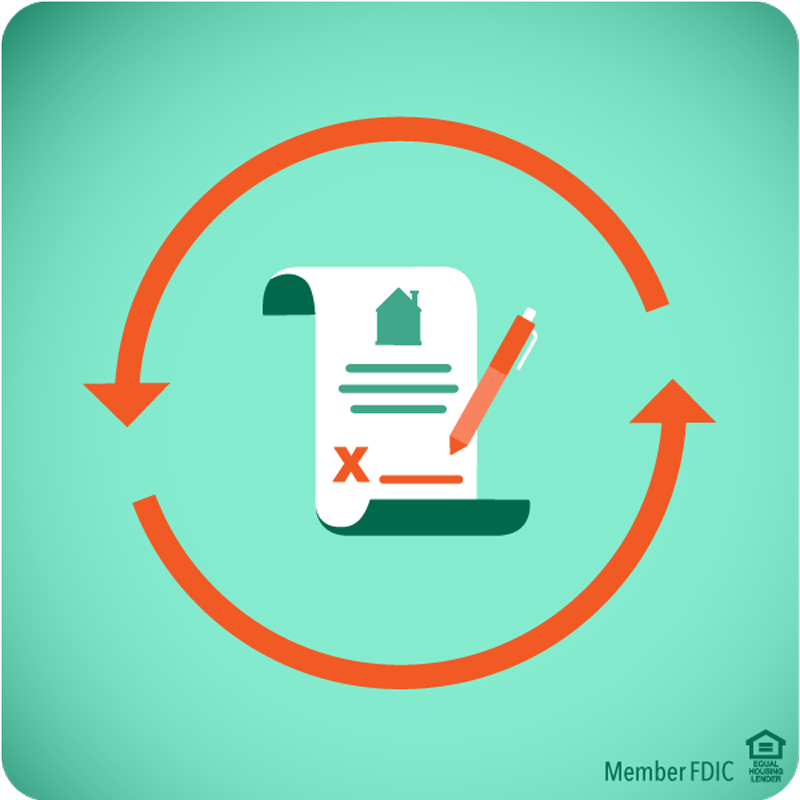FDIC-Insured - Backed by the full faith and credit of the U.S. Government
-
-
-
FNBO
Mortgage
Date Published: October 03, 2022
-

When is the Right Time to Refinance
What is mortgage refinancing, and did I miss out on a good rate?
It’s 2022, do you know where your mortgage rate stands? It’s worth checking because you may be able to refinance your home loan to save money or get cash out to pay down other higher-interest-rate debt.
Regardless of where interest rates are today, there are many questions you should ask before committing to a new home loan.
First things first: What does ‘refinancing’ mean?
Committing to a new mortgage is essentially what you are doing when you refinance your home loan. Refinancing a mortgage means paying off what you owe on your existing home loan and replacing it with a new one.
Why would I refinance?
There are several reasons you might want to refinance your mortgage, but a few of the most popular are:
- To get a lower interest rate
- To shorten the term of your mortgage
- To cash-out home equity you’ve built through ownership
Lowering that interest rate
The most common reason to refinance is to get a lower interest rate. Reducing your interest rate helps you save money on the interest you would pay over the life of your loan, and it helps you build equity in your home more quickly. Plus, it could mean lower monthly payments.
“For example, a 30-year fixed-rate mortgage with an interest rate of 5.5% on a $100,000 home has a principal and interest payment of $568. That same loan at 4.1% reduces your payment to $477,” explains Investopedia.com.
Shortening the duration of your loan
Refinancing is also a way to shorten the term of your loan. With a lower interest rate, you can keep making a monthly mortgage payment that is similar to what you currently pay, but can pay off the loan in a significantly shorter time.
For example, Investopedia explains, “For a 30-year fixed-rate mortgage on a $100,000 home, refinancing from 9% to 5.5% can cut the term in half to 15 years with only a slight change in the monthly payment from $805 to $817. However, if you're already at 5.5% for 30 years ($568), getting, a 3.5% mortgage for 15 years would raise your payment to $715.” Use the Investopedia calculator to see what a change in rate and term will do to your payment.
Other reasons to refinance your home loan include going from an adjustable-rate mortgage to a fixed-rate mortgage when mortgage rates are on the rise. When interest rates are decreasing, it’s vice versa: If you have a fixed-rate mortgage and the interest rates are going down, you might consider switching to an adjustable-rate mortgage so your home loan’s rate can be lowered along with the market rates.
Another reason to refinance is to “cash-out.” When your home is worth more than you owe, you can take out a new mortgage that is larger than what you previously owed on your home’s original mortgage and keep the difference to cover expenses like a major home improvement project, or paying down higher-interest-rate credit card debt, medical bills, tuition fees, etc.
BOTTOM LINE: Ask your lender questions – lots of them
“We can offer examples of how refinancing works and use sample numbers and circumstances, but everyone’s situation is unique,” says Alan LaFollette, Vice President, Home Lending.
“To get a better and more accurate idea of where you stand, and whether or not refinancing your mortgage is a good idea for you, begin by talking with your loan officer.”
Evaluate refinancing with just as much consideration as you did with your original mortgage since you are effectively taking out a new one. Meeting with a loan officer is the best place to start, and when you do, go into the conversation with questions, like:
- What are the closing costs? What fees do you charge? Do you charge lender fees or commission fees?
- Should I go with an adjustable-rate mortgage or a fixed-rate mortgage?
- How long will it take to earn my money back? (Ask your loan officer to perform a break-even analysis.)
- What are my new interest and annual percentage rates?
- Do you offer rates at no-cost refinancing?
- Am I eligible for any mortgage discounts?
- Do you have a price match program on rates?
“There are a lot of questions to ask, and rightfully so. Buying a home is the biggest purchase most people will make in their lifetime, and so is refinancing that investment,” LaFollette adds. “It is important to start the process by meeting with a lender – that’s why we’re here: to answer every possible question you might have.”
If you have mortgage questions, stop by your local FNBO branch or visit this page to find a loan officer near you!
The articles in this blog are for informational purposes only and not intended to provide specific advice or recommendations. When making decisions about your financial situation, consult a financial professional for advice. Articles are not regularly updated, and information may become outdated.
